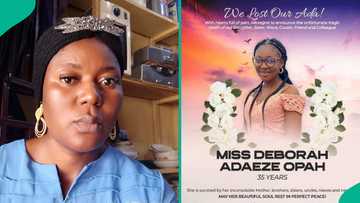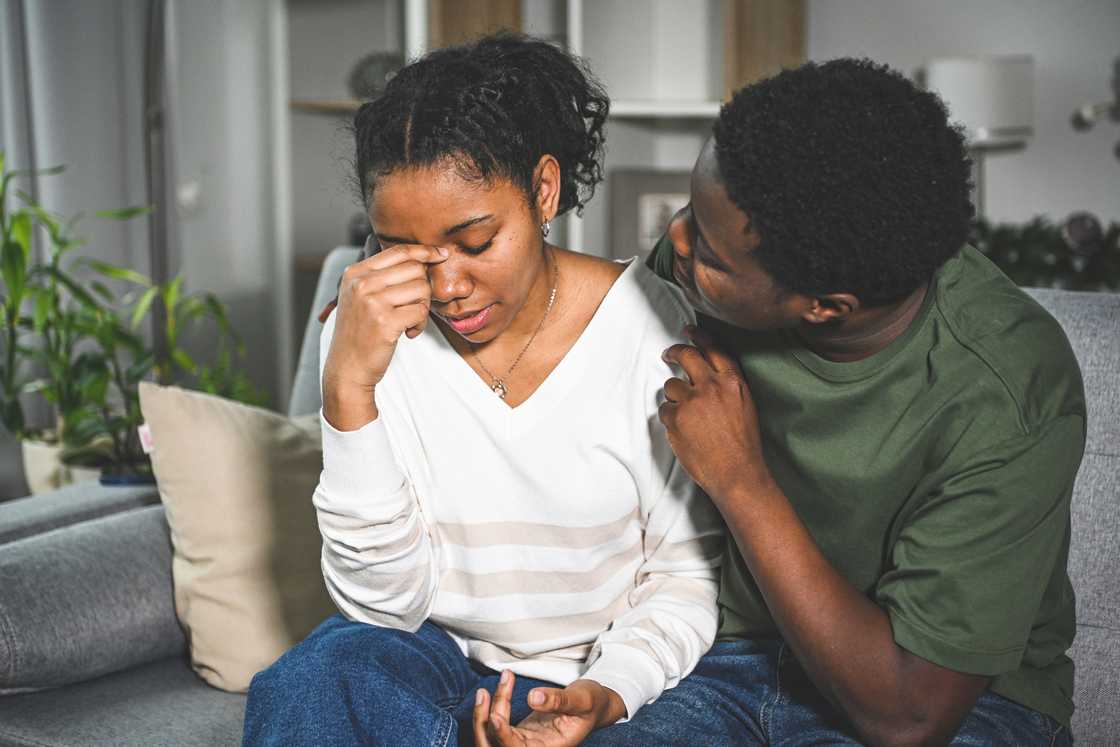He Shames Her on the Trail — She Brings Receipts to Counselling and Changes the Locks
The day it happened, the air smelled like roasted corn and wet sand. We were at Freedom Hill, that quiet slope behind Lekki Conservation Centre, where people sled on those plastic mats when it rains. Femi had organised the hangout, calling it a “spontaneous bonding” for his friends and their partners. I came because saying no had become harder lately.

Source: Getty Images
Halfway through the fun, as I laughed with Tayo about how slippery the mats were, I felt his eyes on me. The look was heavy, dark, searching for a fault. Before I could blink, Femi stood up from where he sat with the cooler box and shouted across the crowd.
“So this is how you move, Teni? You can’t even sit small without flirting?”
The laughter died instantly. Heads turned. Someone’s Bluetooth speaker stopped mid-song.
My mouth went dry. The hill felt steeper. My skin prickled under my damp shirt.

Read also
Burna Boy halts US show, orders man to take sleeping babe home before performing, video trends
He walked toward me, smiling tightly. “You just like embarrassing yourself, abi?”
That was the moment something inside me snapped quietly.
Before the hill, there was the concert.

Source: Getty Images
It was last year’s Detty December, and one of our favourite musicians was headlining at Eko Atlantic. I remember the lights bouncing off his sweat, the crowd swaying like one massive heartbeat. Femi had surprised me with tickets for my birthday, and for a few hours, I thought I was the luckiest woman alive.
Until a guy behind us spilled his drink and apologised to me.
Just a simple “Sorry, babe, my bad.”
Femi’s hand stiffened around my waist. His smile turned brittle. Later, when we got home, he didn’t talk. He just scrolled through his phone while I tried to explain. I didn’t even know the guy. He said, “You like attention too much. You were smiling like you enjoyed it.”

Read also
Regina Daniels sends digs to Ned Nwoko, celebrates massive love from public: “Jokes on you”
That was the first time he accused me of something invisible.
After that came the work barbecue.

Source: Getty Images
My office had a small rooftop party after a big project, and I was in charge of the grill. Femi came because I thought it’d be nice for him to meet my colleagues. Everything went smoothly until my team lead, a married man in his forties, complimented the pepper sauce I made.
“Ah, your babe can cook o,” he told Femi jokingly.
Femi’s laughter was hollow. Later, in the car, he said, “You think I didn’t notice how you smiled at him? You were glowing.”
He said “glowing” like it was a crime.
I remember looking out the window as we crossed Third Mainland Bridge, feeling the water below me calling my name softly. I didn’t recognise that voice in my head back then. I only knew I was tired.
When Femi and I first met, he wasn’t like this.

Source: Getty Images
He was attentive, funny, and intelligent. We met at a tech networking event in Yaba. He said he admired how passionate I was about marketing and startups. We bonded over suya and long Lagos nights filled with traffic and laughter. I thought we had something real.

Read also
“I have nothing left”: Daddy Fresh fights for life, speaks from hospital bed in emotional video
In those early months, he made everything look easy. He called every morning before work, sent me lunch on random Wednesdays, and listened when I ranted about clients. My friends teased me that I had found “husband material.” I believed it.
His charm drew people in, especially my mum, who said, “He sounds responsible.” For a while, I stopped noticing the small things: how he corrected me in front of others, how he’d joke about my makeup being too loud, or how he’d text me ten times if I didn’t reply within minutes. Those signs hid behind his sweetness, and I mistook control for care.

Source: Getty Images
My friends loved him at first. They said he was mature and looked at me like I was his future. And maybe he did. But soon that look became surveillance. He started asking who I was texting, why I stayed late at work, why I wore lipstick to meetings.
When I protested, he’d say, “I’m only trying to protect you. Lagos men are wolves.”
At first, it sounded caring. Until it didn’t.
He once scrolled through my phone while I was asleep. I woke up to him reading my chats with my cousin.

Read also
Man who knew suspect linked to late Ochanya’s case shares details about him: “He was feared”
When I asked why, he said, “If you have nothing to hide, you won’t be angry.”
I believed him for months. I told myself I was overreacting, that maybe I could love him enough to calm his fears. But fear doesn’t shrink. It feeds on silence.
By the time the hill party came around, I had learned to apologise before I understood what I’d done.

Source: UGC
After the scene at Freedom Hill, Femi refused to leave. He acted like he was the one embarrassed.
“Teni, you’re making it worse,” he whispered through clenched teeth.
“Making what worse?” I asked quietly.
He smirked. “You think people didn’t see how you were smiling at Tayo?”
I wanted to disappear. Tayo looked away awkwardly, pretending to sip from his cup. I muttered an apology, the kind that barely had shape.
That night, Femi refused to drive me home. I ordered a taxi and cried silently in the backseat, my reflection blurred by streetlights.
The next day, he sent a message.

Read also
“Your death is scary”: Lady shares how friend died hours after they talked on phone, posts last chat
“If you want this relationship to work, you must stop giving men reasons to disrespect me.”
That was his favourite sentence. I had stopped counting how many times he’d said it.
Two weeks later, he showed up at my office with a lunch bag. Everyone thought it was sweet. They didn’t know it was surveillance. He wanted to see if I’d talk too freely with the men on my team.

Source: Getty Images
When I told him later that I felt suffocated, he frowned.
“You’re ungrateful,” he said. “You complain even when I love you too much.”
One Saturday, we went for brunch at a café in Victoria Island. A waiter smiled at me while pouring juice, and Femi’s tone shifted instantly.
“So that’s your new fan, abi?” he asked loud enough for the next table to hear.
“Femi, please,” I whispered, embarrassed.
“Answer me. You like it when men look at you.”
His voice cut through the café hum. The waiter froze. I smiled nervously, trying to smooth the tension, but my heart thudded painfully.
When we got outside, he said, “You always make me act like this. Why can’t you just behave?”
That night, I apologised again. Not because I believed I was wrong, but because peace had become my only currency.

Source: Getty Images
The breaking point came one humid Thursday in March. He called while I was still in the office and demanded a video call to “prove” I was really working late.
He accused me of lying when I said my phone battery was low.
“You think I’m stupid? Who are you with?”
“Femi, please, stop.”
He hung up. Two minutes later, a message came in. “We’re done. You can go and be free with your new man.”
I should have felt relief. Instead, I panicked. I called and texted him, begging him not to end things. It wasn’t love anymore, but fear of being discarded after trying so hard.
He replied, “If you want me to forgive you, come talk face to face tomorrow.”
I went.
He made me sit in silence for twenty minutes before speaking. “Confess,” he said.

Read also
“I was so scared”: Man reacts as Jarvis spills deep secret about Peller in viral clip, post trends
“Confess what?”
He smiled slightly. “You know.”

Source: Getty Images
“I didn’t do anything.”
He slammed his palm on the table. “You think I’m stupid?”
I cried until my chest ached. He hugged me afterwards and said, “See? That’s all I wanted. Honesty.”
I didn’t realise it then, but that was the day I stopped being in love.
It started with a notebook—a plain brown one I bought from a stationery store in Yaba. I needed to make sense of things, so I started writing. At first, it was random notes. But then I began listing every time he falsely accused me—date, place, trigger, outcome.
I called it my “pattern map.”
The more I wrote, the clearer it became. The concert, the barbecue, the brunch, the office call, Freedom Hill—they all followed the same script.
Trigger: male attention.
Reaction: accusation.
Outcome: my apology.
Each line connected like stitches on a wound.

Source: Getty Images
One day, after another small argument over a colleague’s Instagram comment, I decided to do something different. I booked a session with a counsellor.
When I told Femi, he laughed. “So now I’m mad, abi? You think those people know you more than me?”
I didn’t argue. I just went.
The counsellor, a soft-spoken woman named Mrs Adesina, asked me to tell her everything.
For the first time, I spoke without fear of interrupting myself. She listened quietly, nodding, sometimes jotting notes. When I showed her my pattern map, she leaned forward.
“Teni,” she said slowly, “what you’ve described is not jealousy. It’s coercive control.”
I stared at her, confused.
She explained how coercive control isn’t about anger but domination. It’s when someone uses guilt, accusation, and emotional pressure to make you doubt your own reality.
“It’s like being trapped in a story someone else keeps rewriting,” she said.
Her words broke something open inside me.

Source: Getty Images
I cried so hard that she handed me tissues twice.
She helped me make a list of non-negotiables—things I would no longer tolerate. No monitoring. No public humiliation. No forced confessions.
When I told Femi I wanted counselling together, he smirked. “So you’ve joined the women who think they’re victims.”

Read also
“I Was Alive,” the Billionaire Says — He Walks Into the Will Reading and Disinherits the Plotters
But he came anyway, maybe to prove something.
During the session, he acted calm at first. When Mrs Adesina gently pointed out his patterns, his tone shifted.
“So you’re calling me a monster?”
“No,” she said softly. “I’m saying control isn’t love.”
He laughed bitterly. “She’s twisting everything. You women always side with each other.”
That was when I placed my pattern map on the table between us.
One page. Neat handwriting. All the incidents.
He stared at it silently.
For once, the truth wasn’t mine alone to carry.
After that session, things shifted permanently.

Source: Getty Images
Femi refused to speak to me for days. When he finally called, he said, “If you’re serious about fixing this, delete that woman’s number.”
I said no.
That was the first time I ever said no without shaking.
He came to my apartment the following evening, unannounced. His voice was soft, but his eyes were sharp. “You think one counselling session will turn you against me?”
I stood by the door. “I just want peace, Femi.”
He sighed deeply. “Then stop acting like an enemy.”
That night, I packed a small bag and went to my cousin’s house in Surulere. I told Mrs Adesina, and together we built a safety plan. She connected me with a women’s support group that helped me change my locks and block his contacts.
At first, the silence was strange. I kept expecting my phone to ring with his name flashing. When it didn’t, I felt both relief and grief.

Source: Getty Images
Two weeks later, I saw his name trending on social media. Someone posted a screenshot of his messages to another woman, accusing her of the same things: different face, same script.
It didn’t hurt anymore. It just confirmed what I already knew.
I started attending the Saturday hiking group near Lekki Phase 1. At first, I kept to myself, afraid to laugh too freely. But the air felt different there. No one watched me like a mirror.
There was a man named Kunle who always helped people over steep rocks. He never insisted, just offered quietly. One morning, as I slipped slightly and he steadied me, I realised how foreign that kind of gentleness felt.
It wasn’t romance. It was safety.
Bit by bit, I started to breathe fully again.
I began wearing bright colours. Started cooking for myself again without fear of being judged for who I served first.

Source: Getty Images
The counsellor called one evening just to check in. “How do you feel now?” she asked.
I smiled. “Peaceful. A little sad, but peaceful.”
“That’s healing,” she said. “It rarely comes loud. It comes soft, like morning light.”
Looking back, I realise love isn’t meant to shrink you. It’s supposed to make you feel seen, not studied.
I used to think setting boundaries meant being cold or proud. But now I know boundaries aren’t walls. They’re doors you own. You decide who enters and how long they stay.
Femi painfully taught me that some people don’t want love. They want obedience dressed as affection. They call it protection, but it’s really possession.
What I learned through counselling is that peace isn’t something someone gives you. It’s something you protect, even when your voice trembles.
There’s a difference between being chosen and being controlled.

Source: Getty Images
Sometimes, the bravest thing you can do is to walk away quietly, even when part of you still aches for the version of them you imagined.
I still go hiking on Saturdays. I still flinch a little when someone raises their voice suddenly. But I no longer apologise for the air I didn’t breathe.
Whenever the wind hits my face at the top of that hill, I remember the day he shamed me. And I thank that version of me who finally chose peace.
Because peace, I’ve learned, is not the absence of love. It’s the proof that you survived it.
So I ask you, reading this now — if someone made you doubt your own light, would you dim it to keep them comfortable, or would you finally choose yourself?
This story is inspired by the real experiences of our readers. We believe that every story carries a lesson that can bring light to others. To protect everyone’s privacy, our editors may change names, locations, and certain details while keeping the heart of the story true. Images are for illustration only. If you’d like to share your own experience, please contact us via email.
Source: YEN.com.gh






